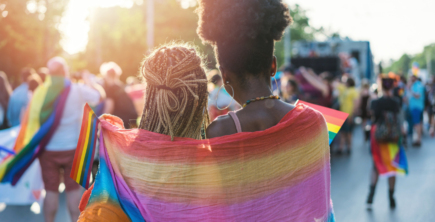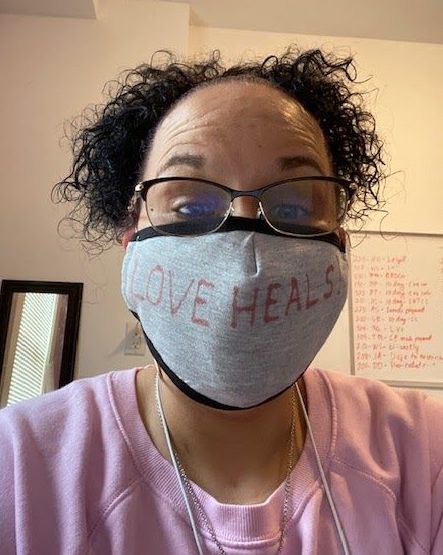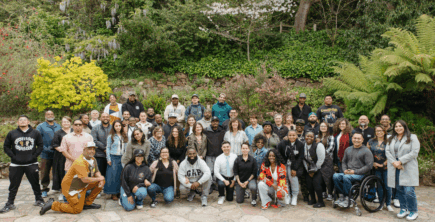
LGBT

"You give me pompoms and I’ll be cheering for DISH. Nobody has believed in me for so long,”
“I haven’t seen my granddaughter or my son who has mental health problems since January because I want them to feel safe,” cries Denise Riggins, a senior general manager of DISH (Delivering Innovation in Supportive Housing). “I miss my people so much.”
Having experienced homelessness as a teen, Riggins is painfully aware that the ability to “shelter in place” at home is a privilege that is tragically unavailable to over 500,000 Americans.
Riggins manages two buildings that house 140 formerly homeless tenants with serious health conditions, including many U.S. veterans. Her tears aren’t solely about being separated from her family while serving as an essential worker on the frontlines of the COVID-19 crisis—they’re also about missing many of her colleagues who are now working remotely to protect the high-risk community she loves whole-heartedly.
Despite the highly contagious nature of the novel coronavirus, Riggins and her coworkers continue to welcome new residents. With critical support from the Tides Stronger Together COVID-19 Response Fund, they have been working tirelessly to implement extensive and costly safety measures to keep their 570 tenants and on-site staff safe.
Having experienced homelessness as a teen, Riggins is painfully aware that the ability to “shelter in place” at home is a privilege that is tragically unavailable to over 500,000 Americans. Due to her mother’s mental health diagnosis, an abusive relationship, and addiction issues, they frequently slept in cars or stayed with different people. “She did her best with what she was given—which was not a lot,” Riggins remembers,“but she wasn’t given basic skills to be a parent and to be active in the world.”

“You give me pompoms and I’ll be cheering for DISH. Nobody has believed in me for so long,” says Denise Riggins, senior general manager of two DISH buildings that continue to welcome formerly homeless tenants during COVID-19.
Given her history, Riggins understands why it’s so important for her tenants to see faces they recognize, like hers, during these current stressful times. “Those coming in off the streets already struggle with feeling isolated even when surrounded by people,” she says.
Riggins shares one unsettling personal experience she had after a resident tested positive for COVID-19: “I have been tested three times, and the first made me cry a little bit. When I went to the hospital, I was in my car and nobody would speak to me. They were all in these white suits and masks—it was like something out of a movie. There was no human connection.” Riggins tears up, recalling, “There was a split moment where I didn’t have that connection, and I thought, ‘How is this going to be for tenants, to be less connected?’”
In addition to feelings of separateness, individuals who experience homelessness are more vulnerable to COVID-19 and death because of limited access to medical care, lack of basic sanitation, and cycles of institutional racism. “They often have underlying health issues, especially Black and Brown people. Some have compromised immune systems and are HIV-positive or have cancer,” explains Riggins, adding that drug overdoses and domestic violence also intensify during stressful events.
Even those with permanent residences in her buildings are at great risk because the virus spreads easily in close living quarters. That’s why both the tenants and staff are holding each other accountable to wear masks. “We are all doing our part, and if a tenant doesn’t believe in wearing a mask, I tell them I just want to protect them from me because I don’t know if I’m infected,” says Riggins. “I’ve never met anyone you couldn’t diffuse with love.”
Riggins and all of her colleagues have been going “above and beyond” to ensure that tenants and essential workers alike are well cared for during the COVID-19 crisis, which unfortunately comes with unforeseen expenses.
“This work is about me giving what I wish I had been given when I experienced homelessness to the people I serve.” — Denise Riggins
Kathy Bolts, deputy director of Social Ventures at Tides explains, “The pandemic has huge budgetary impacts for a lot of nonprofits, but especially DISH because they remain open to their tenants. For example, to reduce risk and comply with the local public health order, they have added costs for additional janitorial services to keep shared spaces sanitized.”
She adds, “The Stronger Together Fund (STF) was developed by Tides for Tides. It uses philanthropic funds to support many of our 140-plus social venture partners by bridging gaps in their budgets for unexpected expenses related to COVID-19.”
Through an initial grant from STF, DISH was able to prioritize the wellbeing of tenants and also essential workers like Riggins by:
Of the team working beside her, Riggins is emphatic: “These are some of the most dedicated people you’ll ever find. We’re making the decision to put our lives on the line, so my mindset is to assume everyone has COVID-19. This is how we need to be right now.”
![Shavonn Griffin and Norman Williams, Desk Clerks for DISH, are shown wearing masks and holind up protective gear and a sign that reads, "Real Life Superheros" [sic]](https://www.tides.org/wp-content/uploads/2023/11/DISH-superheros.jpg)
Real life superheroes: Shavonn Griffin and Norman Williams, Desk Clerks for DISH.
After a decade working for DISH, Riggins is still clear about why she perseveres despite the personal sacrifices she’s making during the pandemic: “This work is about me giving what I wish I had been given when I experienced homelessness to the people I serve. I love my people.”
————————
Tides is issuing an urgent call to donate to Tides Stronger Together COVID-19 Response Fund so that organizations like DISH will have access to resources they need to survive the pandemic and continue their support of vulnerable communities. Because of the incredibly high demand for crisis-related relief, we have had to temporarily pause submissions of grant applications to this critical fund as we focus on getting more donations.
To learn more about DISH, check out this video.

LGBT

Corporate Partners

Philanthropy

Read the stories and hear the voices of social change leaders fighting for justice.